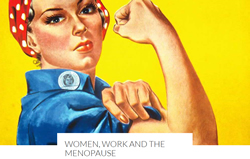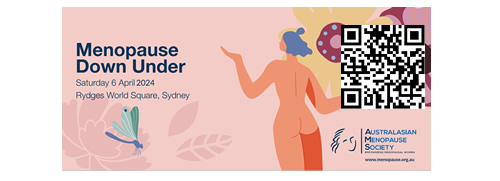 The report presents the key findings and recommendations of a research project entitled Women, Work and the Menopause: Releasing the Potential of Older Professional Women.
The report presents the key findings and recommendations of a research project entitled Women, Work and the Menopause: Releasing the Potential of Older Professional Women.
Data collection took place between November 2013 and March 2014 via two parallel research studies. The first study (The Women at Work Survey) consisted of an online survey of 839 women (age range 40–75 years; average age 51.3 years) employed in academic, administrative and executive roles at three Australian universities. The survey investigated how women’s menstrual status was related to their engagement at work, job satisfaction, organisational commitment and intention to quit. The second study (The Prime Project) involved 48 qualitative interviews with academic and administrative staff members at two Australian universities.
Project Findings
-
The health data collected by the survey indicated that on average, women reported good mental and physical health. Physical health worsened with age, while mental health improved with age.
-
Women currently experiencing the menopause most frequently reported the following symptoms associated with menopause (in descending order of prevalence): sleep disturbance, headaches, weakness or fatigue, loss of sexual desire, anxiety, memory loss, pain in bone joints, and hot flushes.
- None of the measured work outcomes differed by menstrual status. However, the more frequently women reported menopause-related symptoms, and the more bothersome the symptoms were, the less engaged women felt at work, less satisfied with their job, the greater their intention to quit their job, and the lower their commitment to the organisation. Among administrative and executive staff, women aged 40–49 years reported greater intention to quit their jobs than their older colleagues (50–59 years and 60+ years old).
- Negative organisational and managerial messages about older women had a significant impact on how engaged, and how included, women felt at work. Women described various levels of gender and age discrimination or stereotypes within the workplace, which required that they create, maintain or discard certain aspects of their gender identity in order to present a more ‘professionally acceptable’ version of themselves.
- For some women, menopause was a positive time of change in their lives, associated with independence, self-renewal, and career aspirations. They were “ready to go” with the next stage of their career.
-
Both the survey and the interviews pointed to a lack of menopause-specific support or information within organisational settings.
-
Only 30% of respondents reported they had control over the temperature of their immediate working environment. Further analysis revealed that women who reported that they had control over the temperature reported fewer bothersome menopause-related symptoms and experienced symptoms less frequently.
Recommendations for Employers
-
Initiate practical policies such as adequate heating and cooling in office spaces so that body temperatures can be managed more effectively, or making desk fans easily available.
-
Provide line managers and supervisors with training surrounding awareness of day-to-day menopause-related episodes and ways to collaboratively support women.
-
Support, rather than manage, the menopause at work through providing information on the menopause for all employees where they can access rigorous, evidence-based research and advice.
-
Integrate menopause into other organisational policies (e.g., flexible working) and procedures (e.g., occupational health and safety audits).
-
Promote the business case approach to older women in the workplace surrounding ambition, resilience, knowledge and collegial labour as a significant factor in organisational success.
Participant Quotations
“To me, it’s like leading a troop in war. For many women, who have had children, the children are gone, you know. It’s time for a renewed focus on the career.” (Diana, 51, Peri-Menopausal).
“I think it should be a time of recognition of a different age of a woman but I think it’s more a disappearing of women. I’m not sure that I feel that way necessarily but certainly with the job cuts looming I do. I have had thoughts that maybe I would be less able to be employed because of my age. […] I think that generally menopausal women are invisible, certainly as objects of beauty.” (Kirsty, 51, Academic, Peri-Menopausal).
“If you’ve got a manager and head of department who are female, who perhaps have been there or who are sharing their experience with you, then naturally there’s more acceptance and understanding of it. Whereas if you’ve got a male head of department and perhaps male manager, I think you’d suffer more in silence and you wouldn’t share as much.” (Beth, 40–50, Professional, Pre-Menopausal).
Reference
![]() Women, Work and the Menopause Project - last access/dl Sep 2020706.08 KB
Women, Work and the Menopause Project - last access/dl Sep 2020706.08 KB
Final Project
Content updated October 2014






